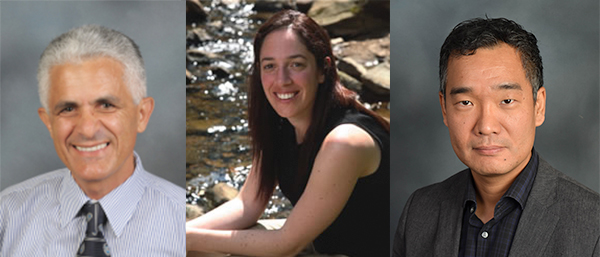Yale, Others Win Coveted Engineering Research Center

As part of an ambitious effort, funded with an $18.5 million grant, Yale University will work with partners from industry, government and other universities to provide clean water to millions of people and make U.S. energy production more sustainable and cost-effective.
The effort will be based out of the Nanotechnology Enabled Water Treatment Systems center (NEWT) at Rice University in Houston. Funded with a five-year renewable grant from the National Science Foundation (NSF), NEWT will be one of the NSF's prestigious Engineering Research Centers (ERC). The NSF will announce this center and two others today in Washington. These join 16 existing Engineering Research Center still receiving federal support.
NEWT brings together experts from Yale, Rice, Arizona State University, and the University of Texas at El Paso to work with more than 30 partners, including Shell, Baker Hughes, UNESCO, the U.S. Army Corps of Engineers and NASA.
The center will focus on compact, mobile, off-grid water-treatment systems. Small enough to fit in a tractor trailer, NEWT's modular water-treatment systems will use nanoengineered catalysts, membranes and light-activated materials to convert water from any source into drinking water. This includes pond water, seawater and floodwater. Solar energy will power the systems, even under cloudy conditions.
Yale's Menachem Elimelech, NEWT co-principal investigator and lead researcher for the membrane processes research, said the center's innovative technologies are founded on research on nanomaterials, membrane dynamics, photonics, and more.
"Our modular water-treatment systems will use a combination of component technologies," said Elimelech, Yale's Roberto C. Goizueta Professor of Environmental and Chemical Engineering. For example, he said, the center will employ reusable magnetic nanoparticles "that can soak up pollutants like a sponge."
The center is focusing on rural areas and low-resource communities that cannot afford large treatment plants or the miles of underground pipes needed to deliver water.
"The importance of clean water to global health and economic development simply cannot be overstated," said Rice's Pedro Alvarez, a professor of civil and environmental engineering. Alvarez, the principal investigator on the NSF grant to establish NEWT, said the center's goal is to attract industry funding and become self-sufficient within 10 years.
 |
| Left to right: Profs. Menachem Elimelech, Julie Zimmerman, and Jaehong Kim. |
Other Yale faculty members involved in the project are Jaehong Kim and Julie Zimmerman, both from the Chemical & Environmental Engineering Department.
"This center is a great opportunity for me to develop new ideas through collaboration with researchers in other institutions," said Kim, who has been developing solar-based water treatment materials and technologies for the past several years.
His role at the center will focus on developing nanomaterials for ridding water of pathogens, pollutants, heavy metals and other contaminants. The nanomaterials will also be used to efficiently generate solar energy.
"These will be the key components of nanotechnology-enabled water-treatment systems that are self-powered and modular for small-scale applications in remote places around the world," he said.

